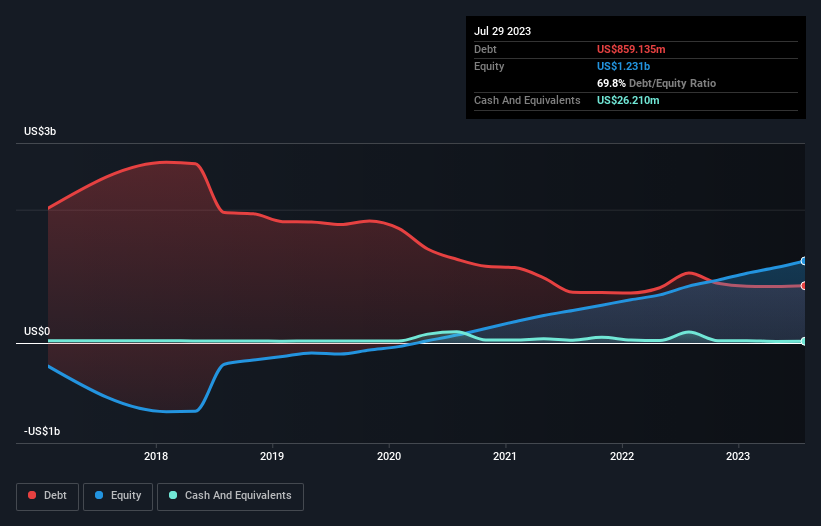- United States
- /
- Food and Staples Retail
- /
- NYSE:BJ
These 4 Measures Indicate That BJ's Wholesale Club Holdings (NYSE:BJ) Is Using Debt Reasonably Well

Legendary fund manager Li Lu (who Charlie Munger backed) once said, 'The biggest investment risk is not the volatility of prices, but whether you will suffer a permanent loss of capital.' When we think about how risky a company is, we always like to look at its use of debt, since debt overload can lead to ruin. Importantly, BJ's Wholesale Club Holdings, Inc. (NYSE:BJ) does carry debt. But the more important question is: how much risk is that debt creating?
When Is Debt A Problem?
Generally speaking, debt only becomes a real problem when a company can't easily pay it off, either by raising capital or with its own cash flow. Part and parcel of capitalism is the process of 'creative destruction' where failed businesses are mercilessly liquidated by their bankers. However, a more common (but still painful) scenario is that it has to raise new equity capital at a low price, thus permanently diluting shareholders. Of course, plenty of companies use debt to fund growth, without any negative consequences. The first step when considering a company's debt levels is to consider its cash and debt together.
View our latest analysis for BJ's Wholesale Club Holdings
How Much Debt Does BJ's Wholesale Club Holdings Carry?
You can click the graphic below for the historical numbers, but it shows that BJ's Wholesale Club Holdings had US$859.1m of debt in July 2023, down from US$1.05b, one year before. On the flip side, it has US$26.2m in cash leading to net debt of about US$832.9m.

How Strong Is BJ's Wholesale Club Holdings' Balance Sheet?
The latest balance sheet data shows that BJ's Wholesale Club Holdings had liabilities of US$2.59b due within a year, and liabilities of US$2.78b falling due after that. On the other hand, it had cash of US$26.2m and US$200.3m worth of receivables due within a year. So its liabilities total US$5.15b more than the combination of its cash and short-term receivables.
This deficit isn't so bad because BJ's Wholesale Club Holdings is worth US$8.66b, and thus could probably raise enough capital to shore up its balance sheet, if the need arose. But we definitely want to keep our eyes open to indications that its debt is bringing too much risk.
We measure a company's debt load relative to its earnings power by looking at its net debt divided by its earnings before interest, tax, depreciation, and amortization (EBITDA) and by calculating how easily its earnings before interest and tax (EBIT) cover its interest expense (interest cover). The advantage of this approach is that we take into account both the absolute quantum of debt (with net debt to EBITDA) and the actual interest expenses associated with that debt (with its interest cover ratio).
BJ's Wholesale Club Holdings's net debt is only 0.85 times its EBITDA. And its EBIT easily covers its interest expense, being 13.7 times the size. So you could argue it is no more threatened by its debt than an elephant is by a mouse. Also good is that BJ's Wholesale Club Holdings grew its EBIT at 11% over the last year, further increasing its ability to manage debt. The balance sheet is clearly the area to focus on when you are analysing debt. But it is future earnings, more than anything, that will determine BJ's Wholesale Club Holdings's ability to maintain a healthy balance sheet going forward. So if you're focused on the future you can check out this free report showing analyst profit forecasts.
Finally, a business needs free cash flow to pay off debt; accounting profits just don't cut it. So it's worth checking how much of that EBIT is backed by free cash flow. Looking at the most recent three years, BJ's Wholesale Club Holdings recorded free cash flow of 45% of its EBIT, which is weaker than we'd expect. That weak cash conversion makes it more difficult to handle indebtedness.
Our View
When it comes to the balance sheet, the standout positive for BJ's Wholesale Club Holdings was the fact that it seems able to cover its interest expense with its EBIT confidently. However, our other observations weren't so heartening. For instance it seems like it has to struggle a bit to handle its total liabilities. When we consider all the elements mentioned above, it seems to us that BJ's Wholesale Club Holdings is managing its debt quite well. But a word of caution: we think debt levels are high enough to justify ongoing monitoring. When analysing debt levels, the balance sheet is the obvious place to start. But ultimately, every company can contain risks that exist outside of the balance sheet. We've identified 2 warning signs with BJ's Wholesale Club Holdings , and understanding them should be part of your investment process.
Of course, if you're the type of investor who prefers buying stocks without the burden of debt, then don't hesitate to discover our exclusive list of net cash growth stocks, today.
Valuation is complex, but we're here to simplify it.
Discover if BJ's Wholesale Club Holdings might be undervalued or overvalued with our detailed analysis, featuring fair value estimates, potential risks, dividends, insider trades, and its financial condition.
Access Free AnalysisHave feedback on this article? Concerned about the content? Get in touch with us directly. Alternatively, email editorial-team (at) simplywallst.com.
This article by Simply Wall St is general in nature. We provide commentary based on historical data and analyst forecasts only using an unbiased methodology and our articles are not intended to be financial advice. It does not constitute a recommendation to buy or sell any stock, and does not take account of your objectives, or your financial situation. We aim to bring you long-term focused analysis driven by fundamental data. Note that our analysis may not factor in the latest price-sensitive company announcements or qualitative material. Simply Wall St has no position in any stocks mentioned.
About NYSE:BJ
BJ's Wholesale Club Holdings
Operates warehouse clubs on the eastern half of the United States.
Adequate balance sheet and fair value.


